Applying Ethical Theory: The Impact of Driverless Trucks on Australia
VerifiedAdded on 2021/04/17
|8
|1529
|24
Report
AI Summary
This report from Charles Sturt University examines the ethical considerations surrounding the implementation of driverless trucks in Australia. It delves into the potential job losses and societal impacts, analyzing the situation through the lenses of utilitarianism, deontology, virtue theory, and contract theory. The report highlights the ethical issues related to reduced employment and employee benefits, exploring the implications of decisions made by transport business owners and the government. It discusses the various ethical theories to evaluate the judgements and decisions made by transport business owners. The report concludes by emphasizing the need for careful consideration of ethical theories to ensure that decisions benefit both society and the environment, while mitigating negative outcomes such as job displacement. The report suggests balancing societal benefits with employee welfare and using ethical theories to assess judgements. This report is a valuable resource for students seeking to understand the ethical dimensions of technological advancements in the transport industry.
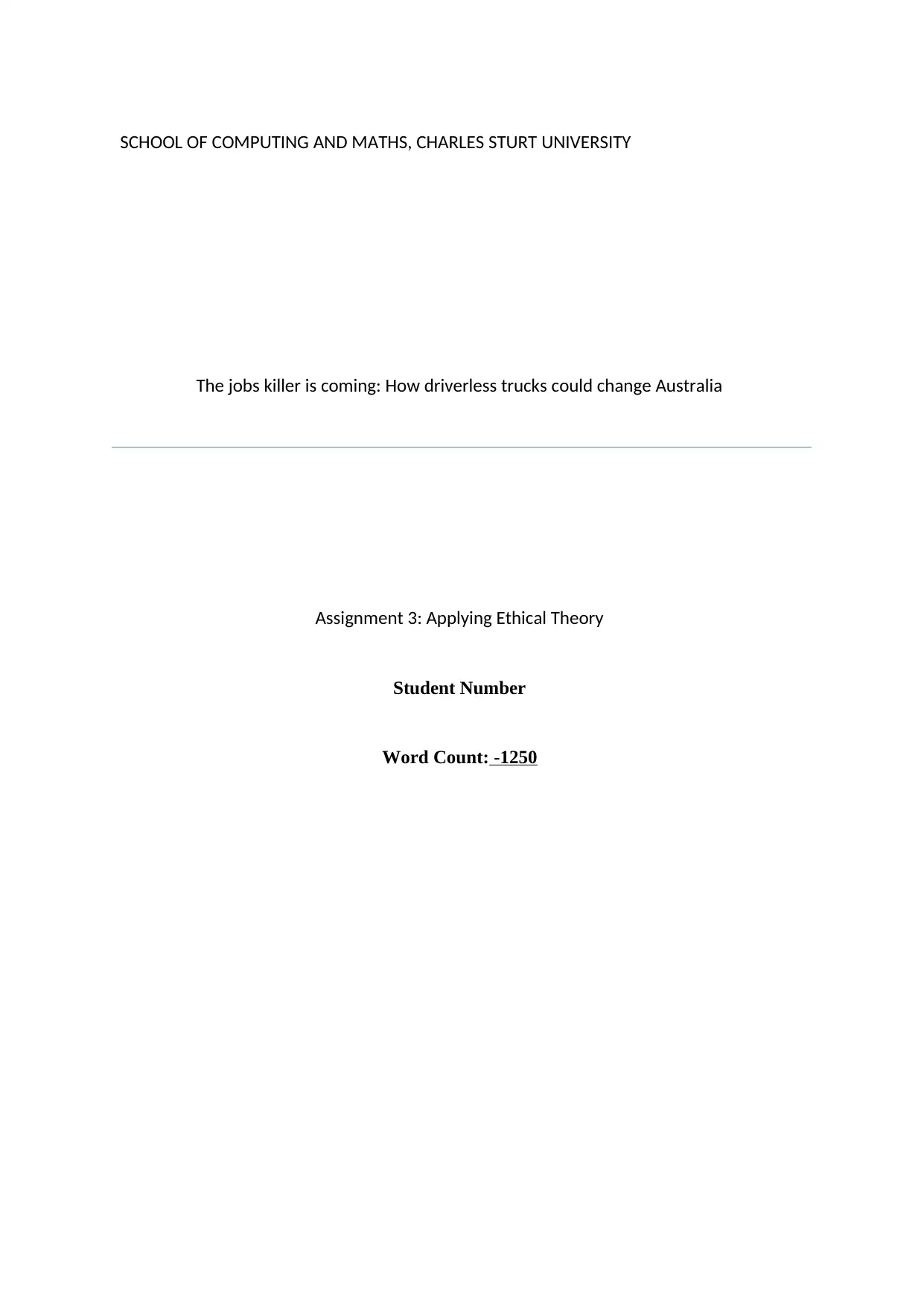
SCHOOL OF COMPUTING AND MATHS, CHARLES STURT UNIVERSITY
The jobs killer is coming: How driverless trucks could change Australia
Assignment 3: Applying Ethical Theory
Student Number
Word Count: -1250
The jobs killer is coming: How driverless trucks could change Australia
Assignment 3: Applying Ethical Theory
Student Number
Word Count: -1250
Paraphrase This Document
Need a fresh take? Get an instant paraphrase of this document with our AI Paraphraser
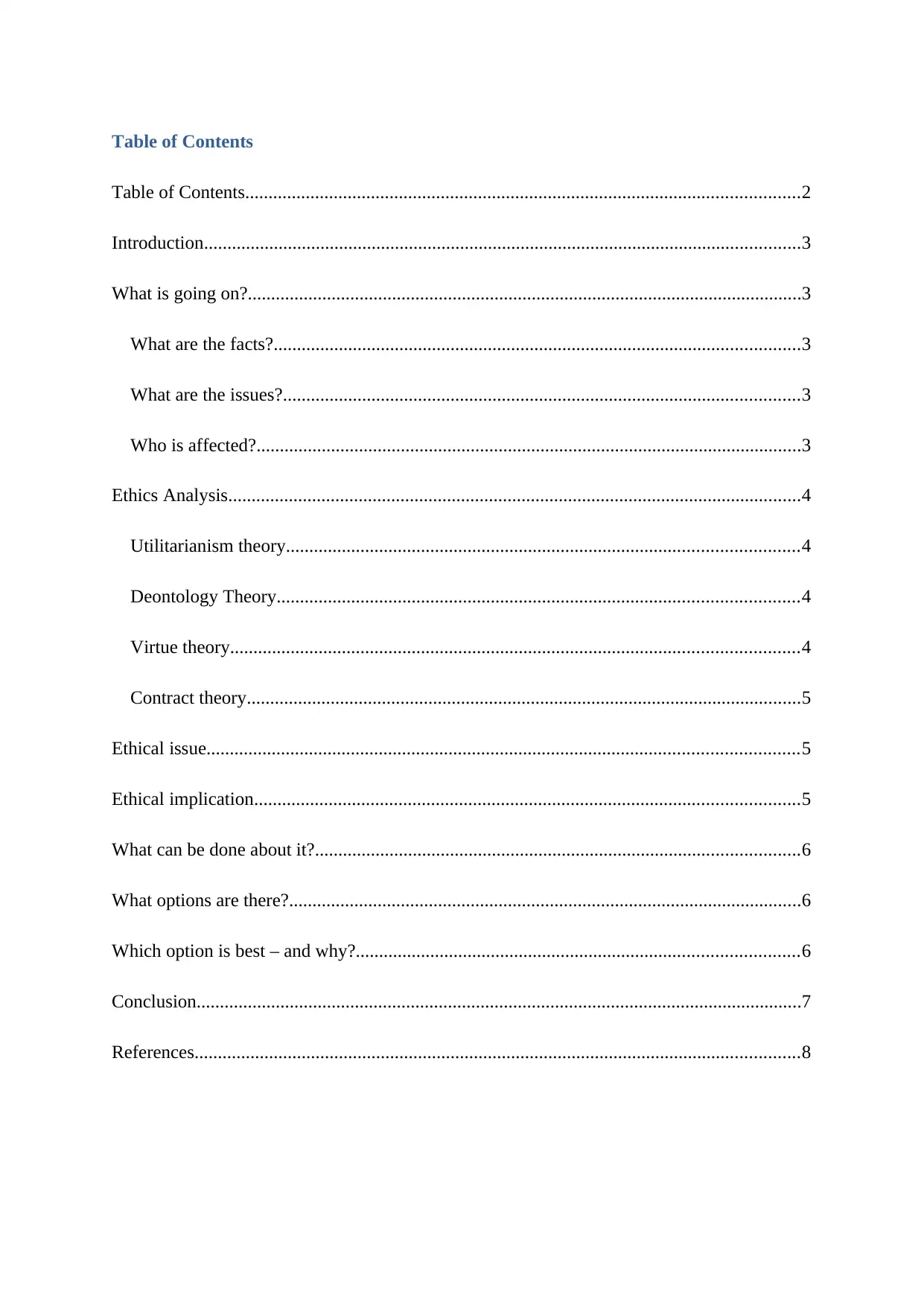
Table of Contents
Table of Contents.......................................................................................................................2
Introduction................................................................................................................................3
What is going on?.......................................................................................................................3
What are the facts?.................................................................................................................3
What are the issues?...............................................................................................................3
Who is affected?.....................................................................................................................3
Ethics Analysis...........................................................................................................................4
Utilitarianism theory..............................................................................................................4
Deontology Theory................................................................................................................4
Virtue theory..........................................................................................................................4
Contract theory.......................................................................................................................5
Ethical issue...............................................................................................................................5
Ethical implication.....................................................................................................................5
What can be done about it?........................................................................................................6
What options are there?..............................................................................................................6
Which option is best – and why?...............................................................................................6
Conclusion..................................................................................................................................7
References..................................................................................................................................8
Table of Contents.......................................................................................................................2
Introduction................................................................................................................................3
What is going on?.......................................................................................................................3
What are the facts?.................................................................................................................3
What are the issues?...............................................................................................................3
Who is affected?.....................................................................................................................3
Ethics Analysis...........................................................................................................................4
Utilitarianism theory..............................................................................................................4
Deontology Theory................................................................................................................4
Virtue theory..........................................................................................................................4
Contract theory.......................................................................................................................5
Ethical issue...............................................................................................................................5
Ethical implication.....................................................................................................................5
What can be done about it?........................................................................................................6
What options are there?..............................................................................................................6
Which option is best – and why?...............................................................................................6
Conclusion..................................................................................................................................7
References..................................................................................................................................8
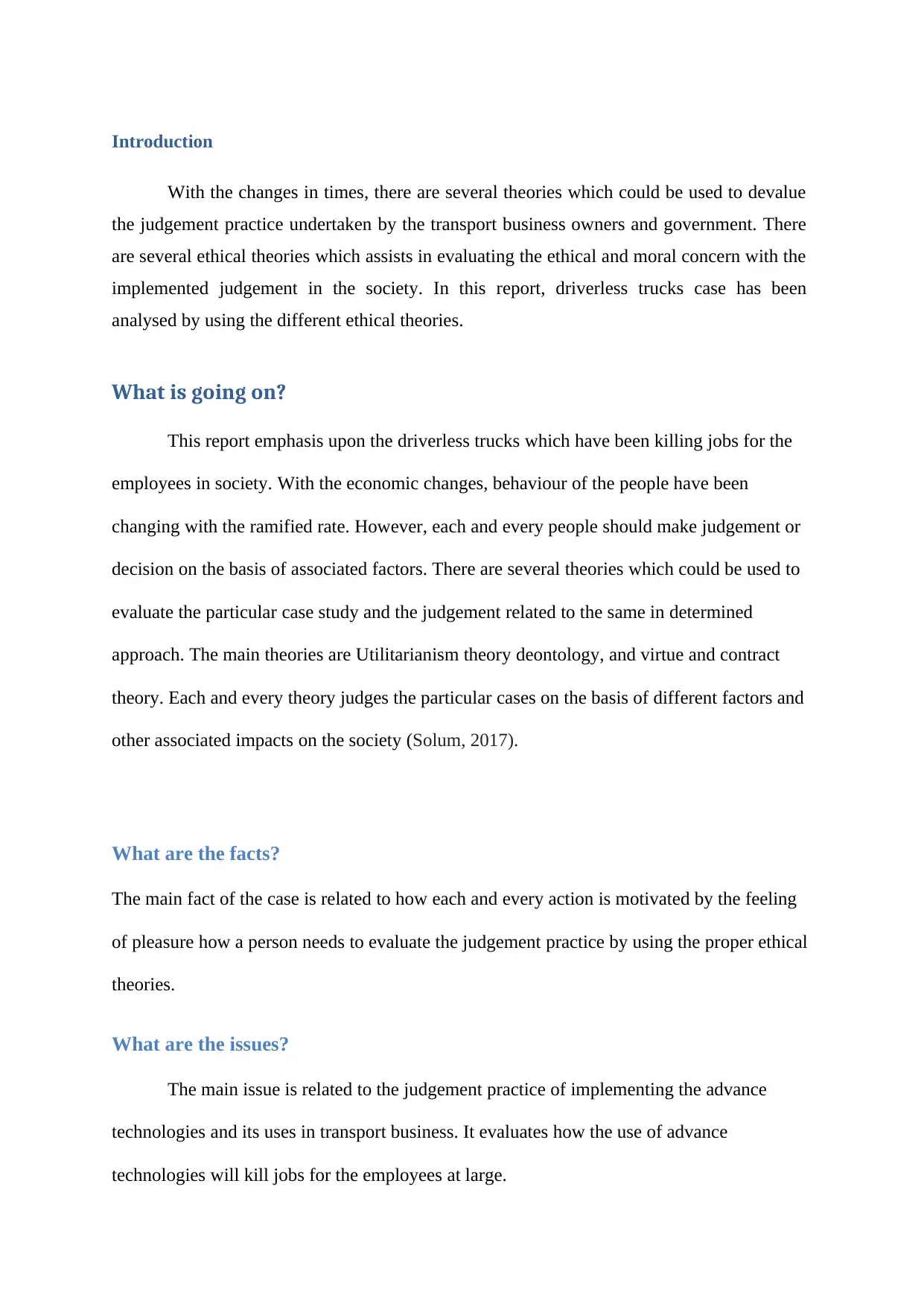
Introduction
With the changes in times, there are several theories which could be used to devalue
the judgement practice undertaken by the transport business owners and government. There
are several ethical theories which assists in evaluating the ethical and moral concern with the
implemented judgement in the society. In this report, driverless trucks case has been
analysed by using the different ethical theories.
What is going on?
This report emphasis upon the driverless trucks which have been killing jobs for the
employees in society. With the economic changes, behaviour of the people have been
changing with the ramified rate. However, each and every people should make judgement or
decision on the basis of associated factors. There are several theories which could be used to
evaluate the particular case study and the judgement related to the same in determined
approach. The main theories are Utilitarianism theory deontology, and virtue and contract
theory. Each and every theory judges the particular cases on the basis of different factors and
other associated impacts on the society (Solum, 2017).
What are the facts?
The main fact of the case is related to how each and every action is motivated by the feeling
of pleasure how a person needs to evaluate the judgement practice by using the proper ethical
theories.
What are the issues?
The main issue is related to the judgement practice of implementing the advance
technologies and its uses in transport business. It evaluates how the use of advance
technologies will kill jobs for the employees at large.
With the changes in times, there are several theories which could be used to devalue
the judgement practice undertaken by the transport business owners and government. There
are several ethical theories which assists in evaluating the ethical and moral concern with the
implemented judgement in the society. In this report, driverless trucks case has been
analysed by using the different ethical theories.
What is going on?
This report emphasis upon the driverless trucks which have been killing jobs for the
employees in society. With the economic changes, behaviour of the people have been
changing with the ramified rate. However, each and every people should make judgement or
decision on the basis of associated factors. There are several theories which could be used to
evaluate the particular case study and the judgement related to the same in determined
approach. The main theories are Utilitarianism theory deontology, and virtue and contract
theory. Each and every theory judges the particular cases on the basis of different factors and
other associated impacts on the society (Solum, 2017).
What are the facts?
The main fact of the case is related to how each and every action is motivated by the feeling
of pleasure how a person needs to evaluate the judgement practice by using the proper ethical
theories.
What are the issues?
The main issue is related to the judgement practice of implementing the advance
technologies and its uses in transport business. It evaluates how the use of advance
technologies will kill jobs for the employees at large.
⊘ This is a preview!⊘
Do you want full access?
Subscribe today to unlock all pages.

Trusted by 1+ million students worldwide
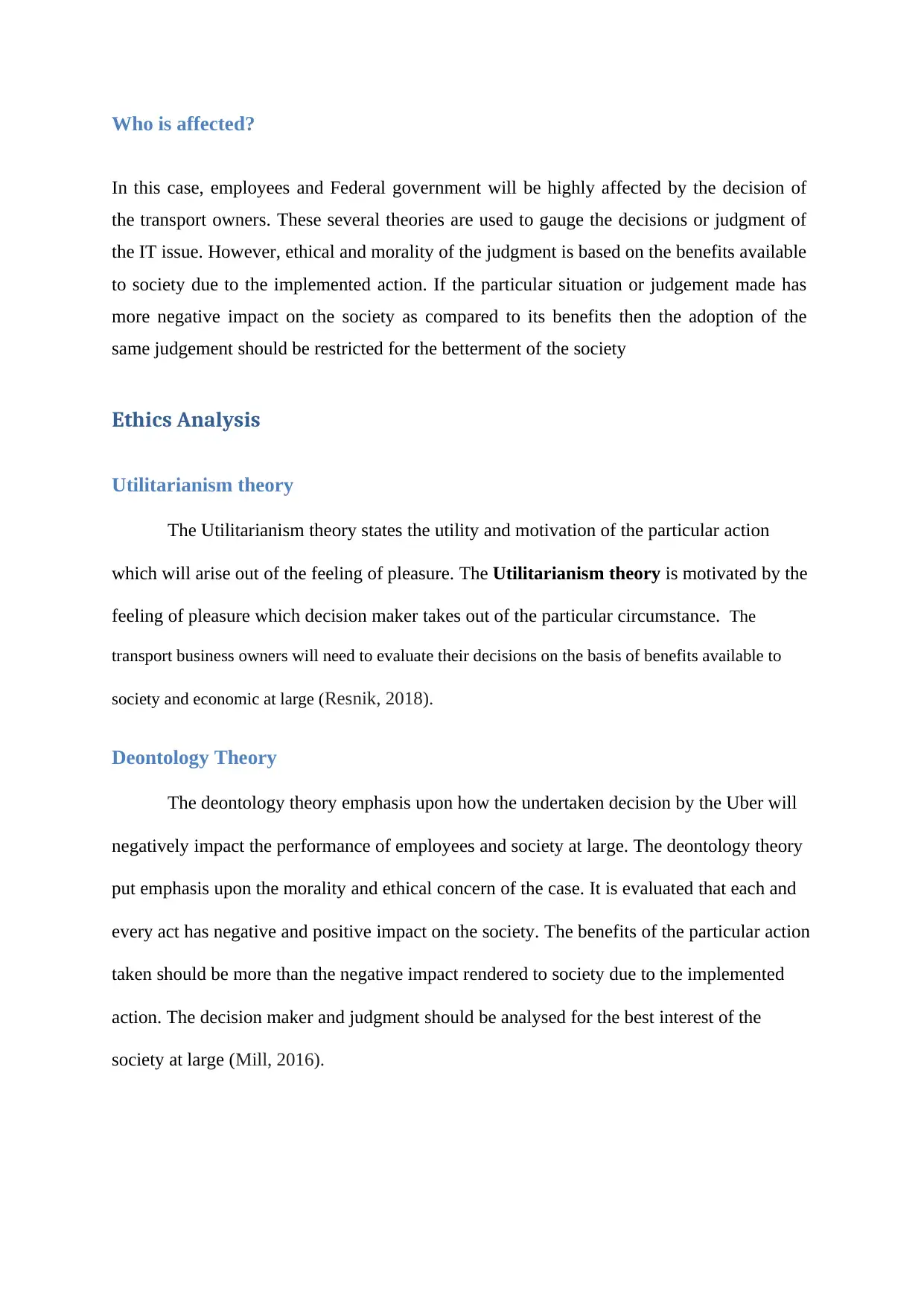
Who is affected?
In this case, employees and Federal government will be highly affected by the decision of
the transport owners. These several theories are used to gauge the decisions or judgment of
the IT issue. However, ethical and morality of the judgment is based on the benefits available
to society due to the implemented action. If the particular situation or judgement made has
more negative impact on the society as compared to its benefits then the adoption of the
same judgement should be restricted for the betterment of the society
Ethics Analysis
Utilitarianism theory
The Utilitarianism theory states the utility and motivation of the particular action
which will arise out of the feeling of pleasure. The Utilitarianism theory is motivated by the
feeling of pleasure which decision maker takes out of the particular circumstance. The
transport business owners will need to evaluate their decisions on the basis of benefits available to
society and economic at large (Resnik, 2018).
Deontology Theory
The deontology theory emphasis upon how the undertaken decision by the Uber will
negatively impact the performance of employees and society at large. The deontology theory
put emphasis upon the morality and ethical concern of the case. It is evaluated that each and
every act has negative and positive impact on the society. The benefits of the particular action
taken should be more than the negative impact rendered to society due to the implemented
action. The decision maker and judgment should be analysed for the best interest of the
society at large (Mill, 2016).
In this case, employees and Federal government will be highly affected by the decision of
the transport owners. These several theories are used to gauge the decisions or judgment of
the IT issue. However, ethical and morality of the judgment is based on the benefits available
to society due to the implemented action. If the particular situation or judgement made has
more negative impact on the society as compared to its benefits then the adoption of the
same judgement should be restricted for the betterment of the society
Ethics Analysis
Utilitarianism theory
The Utilitarianism theory states the utility and motivation of the particular action
which will arise out of the feeling of pleasure. The Utilitarianism theory is motivated by the
feeling of pleasure which decision maker takes out of the particular circumstance. The
transport business owners will need to evaluate their decisions on the basis of benefits available to
society and economic at large (Resnik, 2018).
Deontology Theory
The deontology theory emphasis upon how the undertaken decision by the Uber will
negatively impact the performance of employees and society at large. The deontology theory
put emphasis upon the morality and ethical concern of the case. It is evaluated that each and
every act has negative and positive impact on the society. The benefits of the particular action
taken should be more than the negative impact rendered to society due to the implemented
action. The decision maker and judgment should be analysed for the best interest of the
society at large (Mill, 2016).
Paraphrase This Document
Need a fresh take? Get an instant paraphrase of this document with our AI Paraphraser
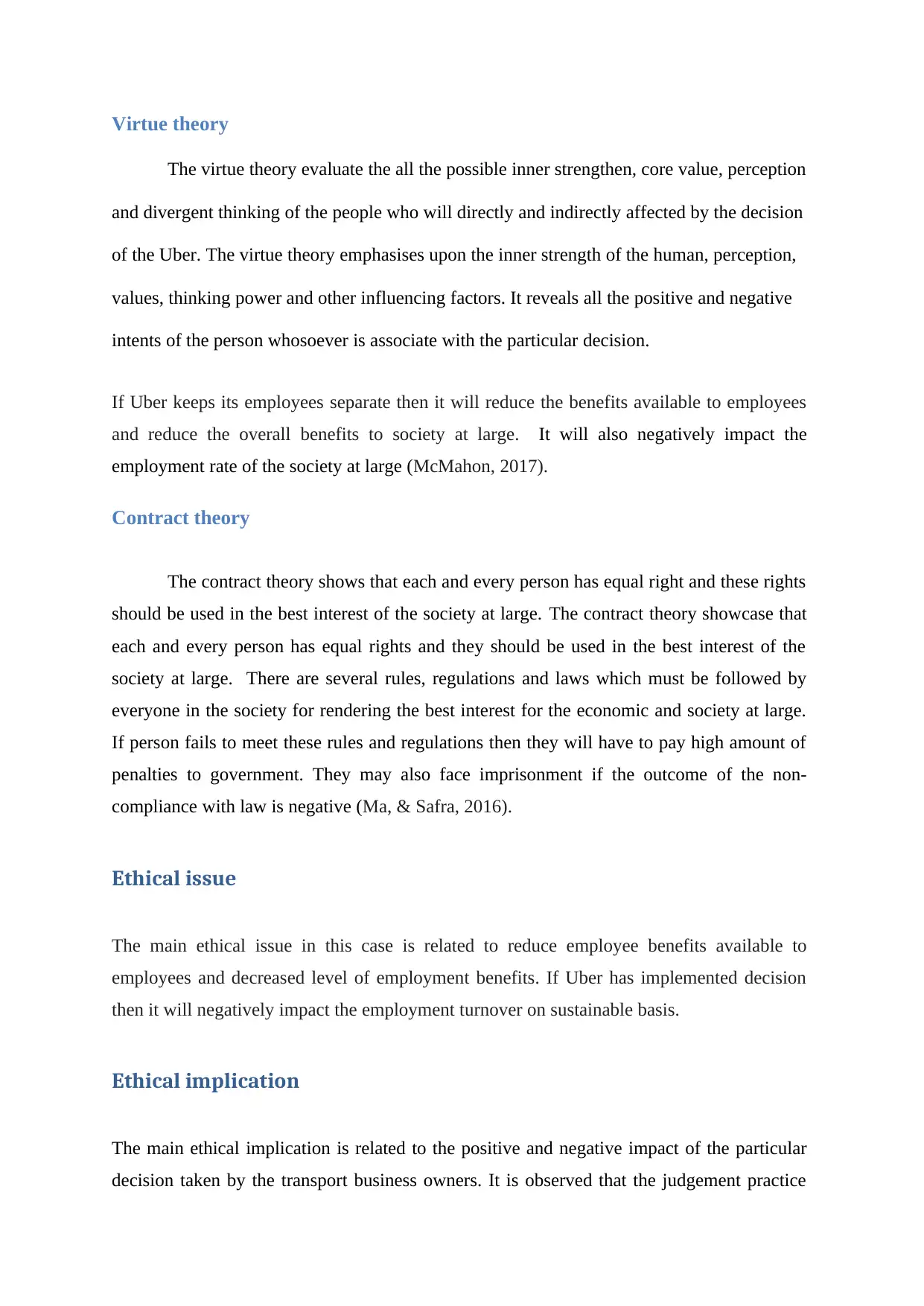
Virtue theory
The virtue theory evaluate the all the possible inner strengthen, core value, perception
and divergent thinking of the people who will directly and indirectly affected by the decision
of the Uber. The virtue theory emphasises upon the inner strength of the human, perception,
values, thinking power and other influencing factors. It reveals all the positive and negative
intents of the person whosoever is associate with the particular decision.
If Uber keeps its employees separate then it will reduce the benefits available to employees
and reduce the overall benefits to society at large. It will also negatively impact the
employment rate of the society at large (McMahon, 2017).
Contract theory
The contract theory shows that each and every person has equal right and these rights
should be used in the best interest of the society at large. The contract theory showcase that
each and every person has equal rights and they should be used in the best interest of the
society at large. There are several rules, regulations and laws which must be followed by
everyone in the society for rendering the best interest for the economic and society at large.
If person fails to meet these rules and regulations then they will have to pay high amount of
penalties to government. They may also face imprisonment if the outcome of the non-
compliance with law is negative (Ma, & Safra, 2016).
Ethical issue
The main ethical issue in this case is related to reduce employee benefits available to
employees and decreased level of employment benefits. If Uber has implemented decision
then it will negatively impact the employment turnover on sustainable basis.
Ethical implication
The main ethical implication is related to the positive and negative impact of the particular
decision taken by the transport business owners. It is observed that the judgement practice
The virtue theory evaluate the all the possible inner strengthen, core value, perception
and divergent thinking of the people who will directly and indirectly affected by the decision
of the Uber. The virtue theory emphasises upon the inner strength of the human, perception,
values, thinking power and other influencing factors. It reveals all the positive and negative
intents of the person whosoever is associate with the particular decision.
If Uber keeps its employees separate then it will reduce the benefits available to employees
and reduce the overall benefits to society at large. It will also negatively impact the
employment rate of the society at large (McMahon, 2017).
Contract theory
The contract theory shows that each and every person has equal right and these rights
should be used in the best interest of the society at large. The contract theory showcase that
each and every person has equal rights and they should be used in the best interest of the
society at large. There are several rules, regulations and laws which must be followed by
everyone in the society for rendering the best interest for the economic and society at large.
If person fails to meet these rules and regulations then they will have to pay high amount of
penalties to government. They may also face imprisonment if the outcome of the non-
compliance with law is negative (Ma, & Safra, 2016).
Ethical issue
The main ethical issue in this case is related to reduce employee benefits available to
employees and decreased level of employment benefits. If Uber has implemented decision
then it will negatively impact the employment turnover on sustainable basis.
Ethical implication
The main ethical implication is related to the positive and negative impact of the particular
decision taken by the transport business owners. It is observed that the judgement practice
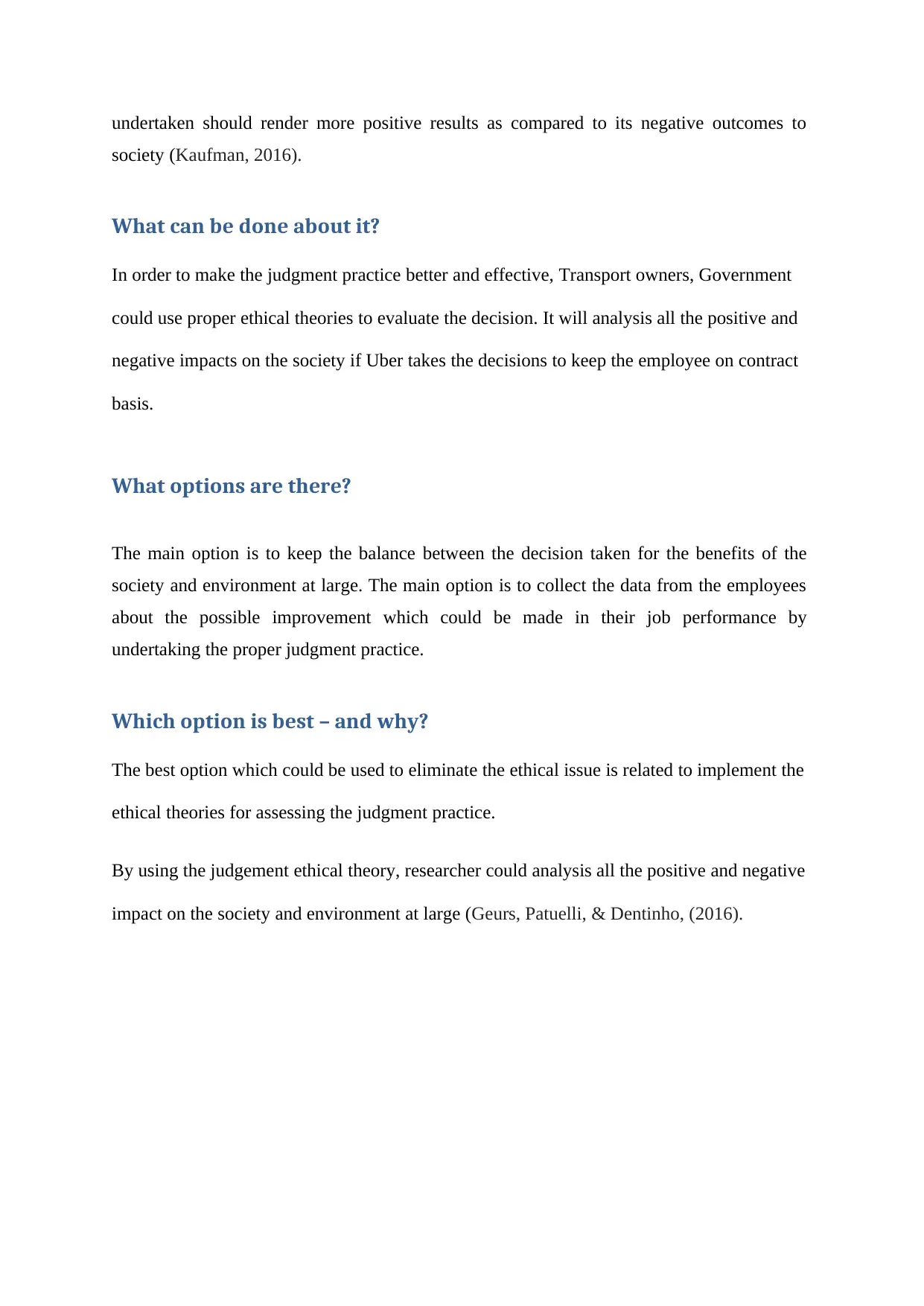
undertaken should render more positive results as compared to its negative outcomes to
society (Kaufman, 2016).
What can be done about it?
In order to make the judgment practice better and effective, Transport owners, Government
could use proper ethical theories to evaluate the decision. It will analysis all the positive and
negative impacts on the society if Uber takes the decisions to keep the employee on contract
basis.
What options are there?
The main option is to keep the balance between the decision taken for the benefits of the
society and environment at large. The main option is to collect the data from the employees
about the possible improvement which could be made in their job performance by
undertaking the proper judgment practice.
Which option is best – and why?
The best option which could be used to eliminate the ethical issue is related to implement the
ethical theories for assessing the judgment practice.
By using the judgement ethical theory, researcher could analysis all the positive and negative
impact on the society and environment at large (Geurs, Patuelli, & Dentinho, (2016).
society (Kaufman, 2016).
What can be done about it?
In order to make the judgment practice better and effective, Transport owners, Government
could use proper ethical theories to evaluate the decision. It will analysis all the positive and
negative impacts on the society if Uber takes the decisions to keep the employee on contract
basis.
What options are there?
The main option is to keep the balance between the decision taken for the benefits of the
society and environment at large. The main option is to collect the data from the employees
about the possible improvement which could be made in their job performance by
undertaking the proper judgment practice.
Which option is best – and why?
The best option which could be used to eliminate the ethical issue is related to implement the
ethical theories for assessing the judgment practice.
By using the judgement ethical theory, researcher could analysis all the positive and negative
impact on the society and environment at large (Geurs, Patuelli, & Dentinho, (2016).
⊘ This is a preview!⊘
Do you want full access?
Subscribe today to unlock all pages.

Trusted by 1+ million students worldwide
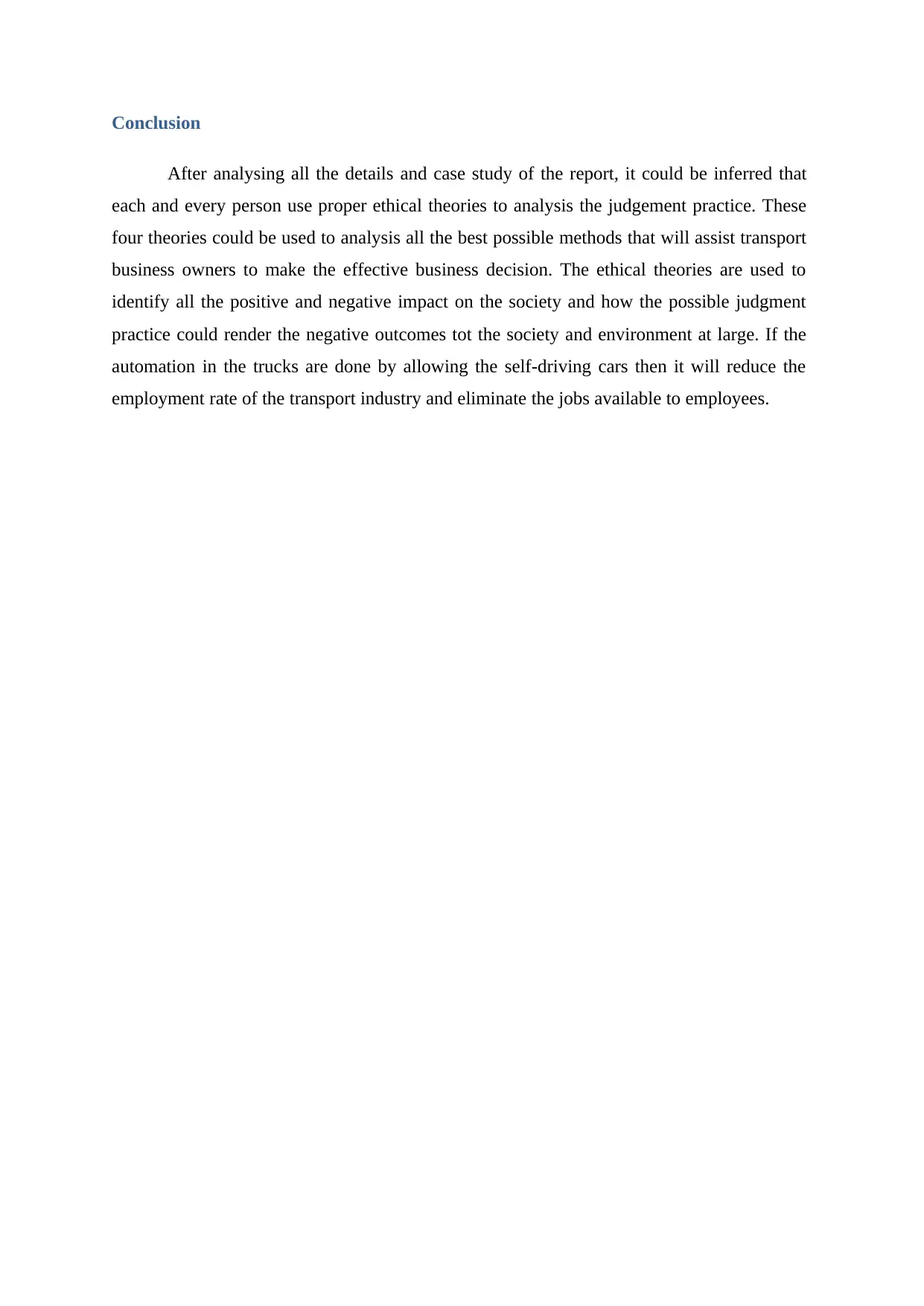
Conclusion
After analysing all the details and case study of the report, it could be inferred that
each and every person use proper ethical theories to analysis the judgement practice. These
four theories could be used to analysis all the best possible methods that will assist transport
business owners to make the effective business decision. The ethical theories are used to
identify all the positive and negative impact on the society and how the possible judgment
practice could render the negative outcomes tot the society and environment at large. If the
automation in the trucks are done by allowing the self-driving cars then it will reduce the
employment rate of the transport industry and eliminate the jobs available to employees.
After analysing all the details and case study of the report, it could be inferred that
each and every person use proper ethical theories to analysis the judgement practice. These
four theories could be used to analysis all the best possible methods that will assist transport
business owners to make the effective business decision. The ethical theories are used to
identify all the positive and negative impact on the society and how the possible judgment
practice could render the negative outcomes tot the society and environment at large. If the
automation in the trucks are done by allowing the self-driving cars then it will reduce the
employment rate of the transport industry and eliminate the jobs available to employees.
Paraphrase This Document
Need a fresh take? Get an instant paraphrase of this document with our AI Paraphraser
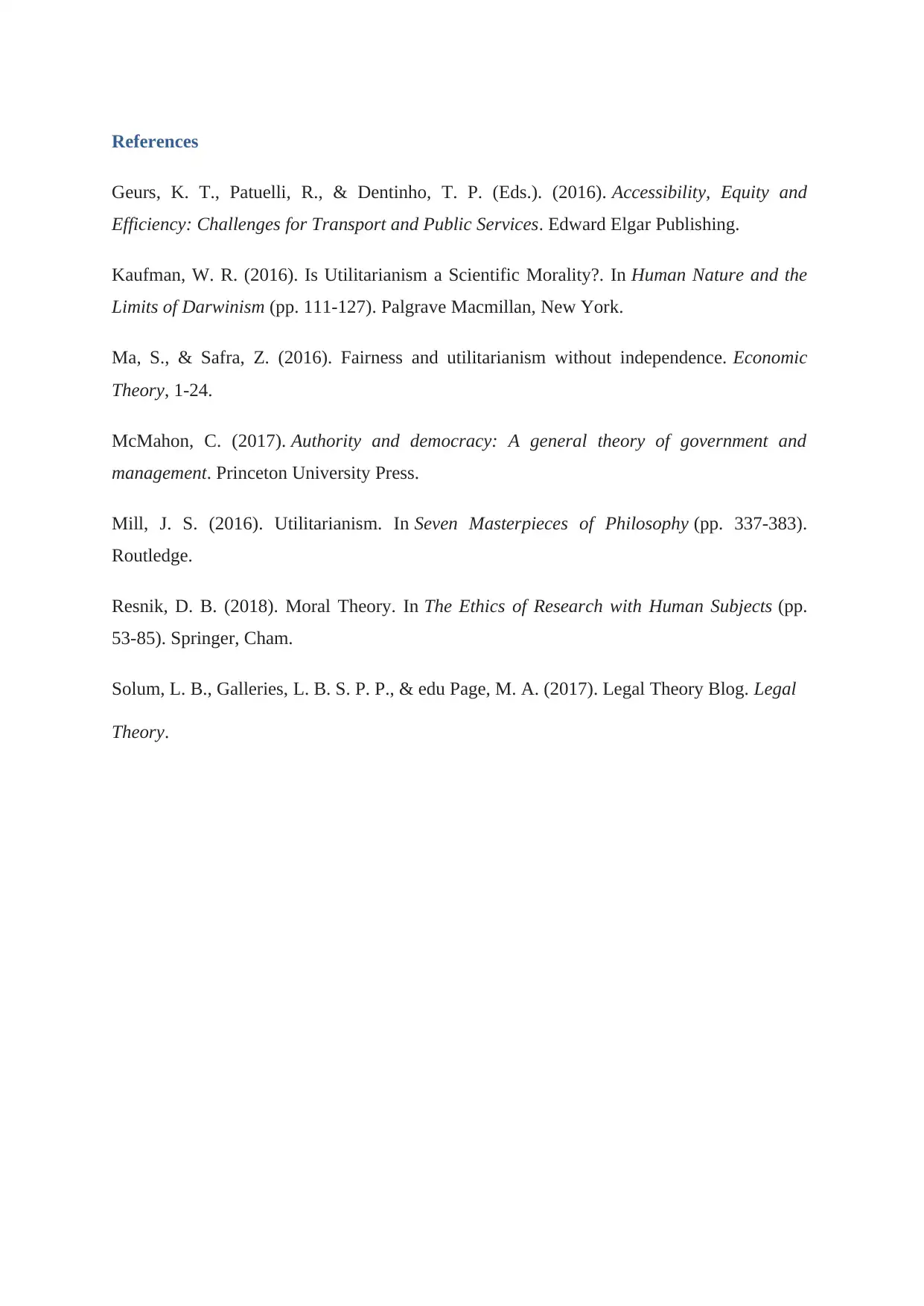
References
Geurs, K. T., Patuelli, R., & Dentinho, T. P. (Eds.). (2016). Accessibility, Equity and
Efficiency: Challenges for Transport and Public Services. Edward Elgar Publishing.
Kaufman, W. R. (2016). Is Utilitarianism a Scientific Morality?. In Human Nature and the
Limits of Darwinism (pp. 111-127). Palgrave Macmillan, New York.
Ma, S., & Safra, Z. (2016). Fairness and utilitarianism without independence. Economic
Theory, 1-24.
McMahon, C. (2017). Authority and democracy: A general theory of government and
management. Princeton University Press.
Mill, J. S. (2016). Utilitarianism. In Seven Masterpieces of Philosophy (pp. 337-383).
Routledge.
Resnik, D. B. (2018). Moral Theory. In The Ethics of Research with Human Subjects (pp.
53-85). Springer, Cham.
Solum, L. B., Galleries, L. B. S. P. P., & edu Page, M. A. (2017). Legal Theory Blog. Legal
Theory.
Geurs, K. T., Patuelli, R., & Dentinho, T. P. (Eds.). (2016). Accessibility, Equity and
Efficiency: Challenges for Transport and Public Services. Edward Elgar Publishing.
Kaufman, W. R. (2016). Is Utilitarianism a Scientific Morality?. In Human Nature and the
Limits of Darwinism (pp. 111-127). Palgrave Macmillan, New York.
Ma, S., & Safra, Z. (2016). Fairness and utilitarianism without independence. Economic
Theory, 1-24.
McMahon, C. (2017). Authority and democracy: A general theory of government and
management. Princeton University Press.
Mill, J. S. (2016). Utilitarianism. In Seven Masterpieces of Philosophy (pp. 337-383).
Routledge.
Resnik, D. B. (2018). Moral Theory. In The Ethics of Research with Human Subjects (pp.
53-85). Springer, Cham.
Solum, L. B., Galleries, L. B. S. P. P., & edu Page, M. A. (2017). Legal Theory Blog. Legal
Theory.
1 out of 8
Related Documents
Your All-in-One AI-Powered Toolkit for Academic Success.
+13062052269
info@desklib.com
Available 24*7 on WhatsApp / Email
![[object Object]](/_next/static/media/star-bottom.7253800d.svg)
Unlock your academic potential
Copyright © 2020–2026 A2Z Services. All Rights Reserved. Developed and managed by ZUCOL.





